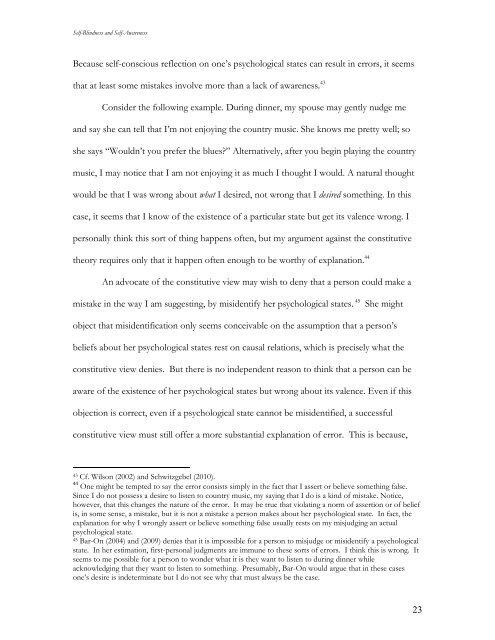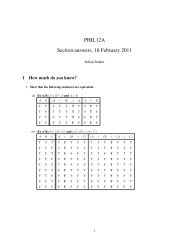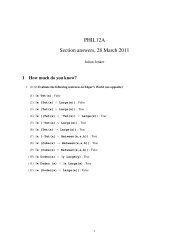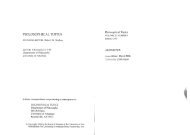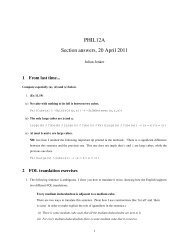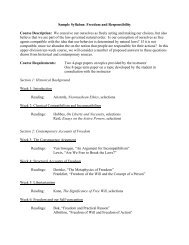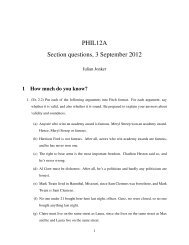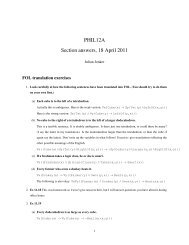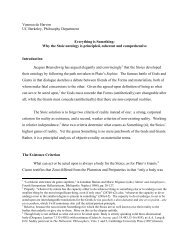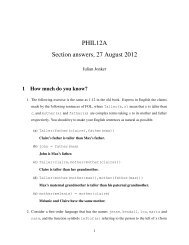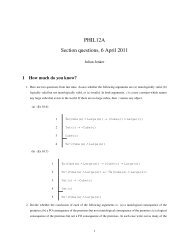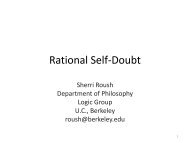SELF-BLINDNESS AND SELF-AWARENESS - Philosophy
SELF-BLINDNESS AND SELF-AWARENESS - Philosophy
SELF-BLINDNESS AND SELF-AWARENESS - Philosophy
You also want an ePaper? Increase the reach of your titles
YUMPU automatically turns print PDFs into web optimized ePapers that Google loves.
Self-Blindness and Self-AwarenessBecause self-conscious reflection on one’s psychological states can result in errors, it seemsthat at least some mistakes involve more than a lack of awareness. 43Consider the following example. During dinner, my spouse may gently nudge meand say she can tell that I’m not enjoying the country music. She knows me pretty well; soshe says “Wouldn’t you prefer the blues?” Alternatively, after you begin playing the countrymusic, I may notice that I am not enjoying it as much I thought I would. A natural thoughtwould be that I was wrong about what I desired, not wrong that I desired something. In thiscase, it seems that I know of the existence of a particular state but get its valence wrong. Ipersonally think this sort of thing happens often, but my argument against the constitutivetheory requires only that it happen often enough to be worthy of explanation. 44An advocate of the constitutive view may wish to deny that a person could make amistake in the way I am suggesting, by misidentify her psychological states. 45She mightobject that misidentification only seems conceivable on the assumption that a person’sbeliefs about her psychological states rest on causal relations, which is precisely what theconstitutive view denies. But there is no independent reason to think that a person can beaware of the existence of her psychological states but wrong about its valence. Even if thisobjection is correct, even if a psychological state cannot be misidentified, a successfulconstitutive view must still offer a more substantial explanation of error. This is because,43 Cf. Wilson (2002) and Schwitzgebel (2010).44 One might be tempted to say the error consists simply in the fact that I assert or believe something false.Since I do not possess a desire to listen to country music, my saying that I do is a kind of mistake. Notice,however, that this changes the nature of the error. It may be true that violating a norm of assertion or of beliefis, in some sense, a mistake, but it is not a mistake a person makes about her psychological state. In fact, theexplanation for why I wrongly assert or believe something false usually rests on my misjudging an actualpsychological state.45 Bar-On (2004) and (2009) denies that it is impossible for a person to misjudge or misidentify a psychologicalstate. In her estimation, first-personal judgments are immune to these sorts of errors. I think this is wrong. Itseems to me possible for a person to wonder what it is they want to listen to during dinner whileacknowledging that they want to listen to something. Presumably, Bar-On would argue that in these casesone’s desire is indeterminate but I do not see why that must always be the case.23


